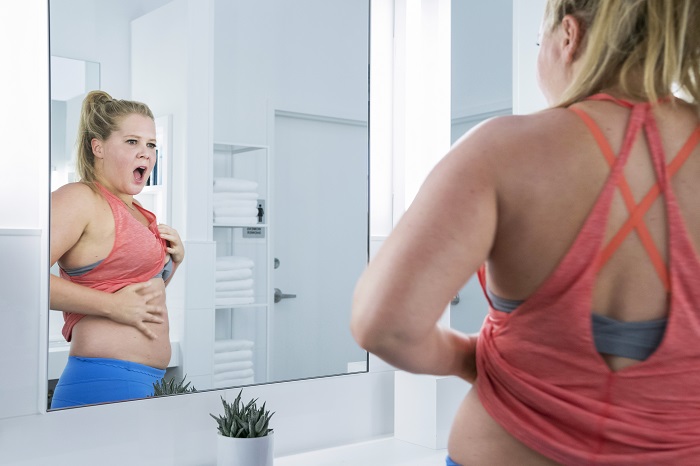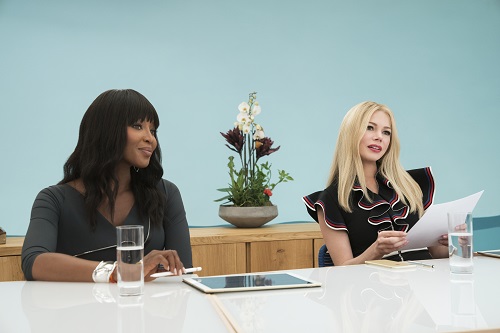

The Hypocrisy of Amy Schumer's 'I Feel Pretty' Is Exhausting, and We Don't Even Get a Makeover Montage!
By Roxana Hadadi | Think Pieces | April 21, 2018 |
By Roxana Hadadi | Think Pieces | April 21, 2018 |

There are many things that will determine whether you’ll like I Feel Pretty or not. Kristy’s review should be enough! Yet there’s also your tolerance level for Amy Schumer, if you like seeing Busy Philipps in various Madewell outfits you recognize from her Instagram (oh, just me?), if you thirst still for the broad shoulders of Dickon Tarly (Tom Hopper) and wish Dany hadn’t commanded Drogon to burn him alive on the last season of Game of Thrones. But I think the core issue is this: Do you think the film is mocking Schumer’s character while trying to then shame us for laughing with a script that, over and over again, compels its characters to react negatively to her? Is the film failing to support its message of body positivity in its relentless pursuit of easy jokes at the expense of Schumer’s body (which is totally fine, by the way)?
There are arguments to be had about this. In promo interviews, Schumer maintains that the film is misunderstood, and keeps rejecting the social media backlash that has lingered around the film since its trailer release. Philipps, who has a supporting role in the film, which her husband Marc Silverstein co-wrote and co-directed with his creative partner Abby Kohn, has been promoting it on her very popular Instagram account. And the PR push for the film, with the Twitter hastag #FeelPretty, really wants to send out this message that the film challenges women to confront their own insecurities and find their beauty.
Kristy was very clear in her review that this movie really doesn’t deliver in a way that feels genuine, and I agree. Here are some things I scrawled down in my notes while watching the film:
• The first time the size of Schumer’s character, Renee, is brought up, it’s by a woman (the underused Sasheer Zamata) who compares her body to “a trailer”
• We see a baby start crying at the sight of her face
• When Renee stands in front of her mirror in a too-small bra and Spanx, the scene isn’t played for sympathy, but pity as she struggles to get her clothes off
• To prove both Renee’s makeup-application skills and friend-shaming, the film has her recreate a Selena Gomez look on BFF Vivian (Aidy Bryant), with Renee saying the makeover is successful because “You don’t look like yourself”
• After a concussion that causes Renee to believe her body has changed and she’s become unrecognizably beautiful, she enjoys being catcalled
• Once “transformed,” Renee says things like “Aren’t girls like us so lucky?” and “You gotta lead with your hotness,” and is incredibly rude and dismissive to her friends
• And she remains flippantly, aggressively self-involved; when planning to take new photos for a dating website, she says of the theme, “I don’t know what it is, but it’s gonna be hip-hop, and it’s gonna be hot!”

I Feel Pretty is presenting itself as the kind of film that reveals how ugly we are for laughing at body-related stereotypes, but then why make those your jokes? Why linger on Schumer’s stomach or her thighs during a bikini contest? Why tear open her leggings during a bicycling class to reveal her neon pink underwear? Why make women of color the most consistently nasty to her, from Zamata’s judgmental gym employee to Naomi Campbell eyeing her with disdain during a job interview to model-like coworkers looking at her with revulsion whenever she eats or talks? Most everyone reacts to her newfound confidence with dumbfounded confusion, and that’s not believable satire, it’s clumsy writing.

Like so many romantic comedies before it, in I Feel Pretty Renee works in a typically “feminine” field as a receptionist at Lily LeClaire, a high-end cosmetics company that is working on a line for “regular” women to be sold at stores like Target (one of the best moments in the film is how Michelle Williams, working a breathy, baby voice as businesswoman Avery LeClaire, adds a few too many syllables to “Kohl’s”). Avery is drawn to Renee because of her insights as a “regular” woman; Avery’s brother Grant (played by the very hot Hopper), develops a romantic attraction to Renee, mentioning how she “dazzles.” But even they, people who ostensibly like her, view her primarily in relation to other women: Grant is mentioned as often dating Brazilian supermodels; Avery is praised for hiring someone who looks like Renee. The movie reduces her character over and over again to a body type, even as it attempts to argue against that very act. Avery and Grant both end up treating Renee like an other, a curiosity whose differences are defining, but the guy Renee’s dating does the same thing, too, amazed by how she wants to keep the lights on during sex and awkwardly praising her on how “you don’t really care how the world sees you.”
But there’s a difference between not caring how the world sees you, truly not needing to look more “conventionally” feminine to be confident, and acquiescing to those societal demands as a way to feel accepted, and I Feel Pretty doesn’t pick up on that nuance. I mean, look at all the makeover montages we’ve seen over the years — My Big Fat Greek Wedding and its treatment of body hair; The Devil Wears Prada and the use of high fashion to demonstrate self-worth; The Breakfast Club and the bow in Ally Sheedy’s hair; straighter hair and tighter clothes in The Princess Diaries and Clueless and Miss Congeniality — in all of these films women are presented as feeling better and being better when they look more like we expect them to look, and I Feel Pretty does the same thing.
All of these films expect us to accept, as I Feel Pretty does with Schumer, that Nia Vardalos, Ally Sheedy, Anne Hathaway, Brittany Murphy, and Sandra Bullock, are wrong somehow. Doesn’t the emotional payoff of a makeover come from the preceding acceptance that the starting product was subpar? Needing of improvement? And that’s why Renee ends I Feel Pretty in a red sheath dress, her long, blond hair affixed in a high ponytail, shilling makeup from a company of “elitist pricks.” When Renee asks the crowd “What if we didn’t care how we looked?” she then follows it up with “You are beautiful” and “We’re all the face of Lily LeClaire,” to cheers from friends who stood by as she ridiculed them and models who ridiculed her in turn.
This is supposed to be equality, but in it, the empowered declaration and the capitalist call to buy, buy, buy become linked. Only when Renee’s femininity is validated by the wealthy and the powerful does she accept it for herself. And there’s something deeply reductive about that, isn’t there? Doesn’t it suggest that the only thing most women want is acceptance by people they perceive to be better than them? I Feel Pretty is claiming to be different from the norm, but that’s the same mixture of cynical and condescending that we as women have dealt with our entire lives.
I can respect the intentions of I Feel Pretty, sure. But the simplistic and heteronormative ways it goes about delivering that message hurt its messaging rather than help it.
← 'The Graham Norton Show': Benedict Cumberbatch, Matt LeBlanc, Mary Berry | "Making It" Will Premiere This Summer On NBC →

What’s Old Is New Again: Old Hollywood Glamour Glitters at the 2024 Oscars
Al Pacino Presents Best Picture Oscar, Confuses Everyone
The Dangerous Lie Of 'TradWives'
A Legendary Horror Franchise Is Headed To Television
'The Mandalorian' Season 4 Is Probably Not Happening
Halle Bailey On Why She Chose To Keep Her Pregnancy Private
More Like This
Nu Metal Can't Be Back Because It Never Left
Queerness Is a Gift
The Norman Lear Center Released A Report About Hollywood Gun Violence
If It's AI, It Isn't Art
The Problem with Crossovers
Reviews